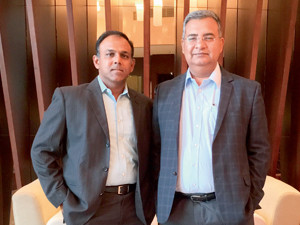Jay Nair, SBU Manager at Henkel Adhesives Technologies India Pvt. Ltd, has his eye on the Middle East and Africa’s growing flexible packaging market for his company’s adhesives  In regions including the Middle East and Africa, the issue is also fast gaining prominence, he explained.
In regions including the Middle East and Africa, the issue is also fast gaining prominence, he explained.
“Food safety in some markets is one of the biggest discussion points,” he said.
“It is something we believe we’re pioneering – not just in creating awareness but also in actually providing food-safe packaging.”
Henkel takes the view there should be “no difference” between regions – whatever their stage of development – in terms of food safety, he added. And, in any case, recent moves in China, Turkey, and Latin America show how swiftly diverging standards can align.
“In the Middle East, authorities are showing an interest in how it is done in other regions, exchanging with lawmakers in very mature markets,” he said.
Henkel’s job title for region, Jay Surname, told Packaging MEA how the company is looking to build on its already considerable presence in flexible packaging in the Middle East.
Out of Africa “The market in Middle East and Africa especially for flexible packaging is close to 10,000 packs and it is growing at about 10–12%,” he said.
“In the past a lot of packaging material was being imported into the region… But over the last few years the local manufacturers have updated their technology, getting the latest equipment and latest technologies and they are more or less producing all kinds of flexible packaging here.”
In his view, the MEA is already “a very world market” where “slowly and steadily you will see a big drop in imports of flexible packaging”, set to drive further growth. Meanwhile, alongside the emergence of a wide range of flexible packaging, the other big trend is “a lot of activity now in Africa as well”.
“I’m clearly seeing that there are more and more companies who are investing [in Africa] now,” he said. “Today what’s happening is a lot of materials being manufactured in Middle East is being exported to Africa. But I think, going forward, Africa will also start producing locally. So I am seeing a lot of manufacturers from Middle East actually setting up operations in Africa. That is also a trend that is happening very clearly. So I think we are seeing a great opportunity here.”
Bonding with decision makers In terms of technology, Surname sees “more and more companies” and “more and more applications” moving into solvent free. “So that’s one clear technological direction,” he told Packaging MEA.
“In the flexible packaging pack, the cost of adhesive is very small: 3 to 5 or 8%, depending on the application,” added surname. “So it’s not a big cost component when someone is into flexible packaging. But if something goes wrong with it, then the other 99% or 98% of the product is thrown away or is wasted. That’s the kind of impact it has. So the involvement is low but the risk is very high. Henkel has therefore spent a lot of money and effort in training people.”
For surname, Henkel stands out for the quality of its technical support team and takes a holistic approach to solving customers’ problems.
“Customer problems are not only about applying the adhesive,” he said. “It’s about the package working in the market place. The filling food test that we do. The accelerated shelflife test that we do. We recommend customers what kinds of substrates they should use for effective flexible packaging. So I think the big differentiator is that for us it’s not like selling polymers… For us it is about ensuring that the customer’s product also performs in the market.”
As regulations tighten, surname sees further opportunities arise. “We are engaging with the regulators, with policymakers in each of these countries, in whatever way we can to discuss what kind of standards are available, what the US is doing, what Europe is doing,” he said. “That is the kind of engagement we do… In each country it’s specific… And I think that’s one of our key agendas.”



